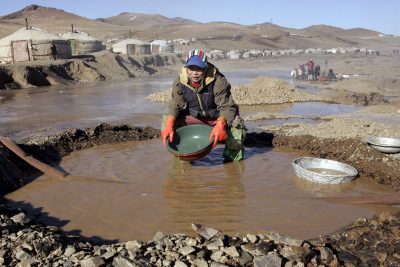Author: Jargalsaikhan Mendee, UBC
Having held its first multi-party election in 1990, Mongolia is a democratic outpost in a tough authoritarian neighbourhood. Thus the country enjoys a wide spectrum of political and economic support from developed democracies. Political power has been transferred peacefully between two contending political parties, civil and political rights are respected and public discontent is freely expressed. Moreover, Mongolia overcame a daunting economic transition from socialism with the assistance of international financial institutions and donor countries like the United States, Japan and Germany, and with help from its own agricultural economy, shuttle traders and foreign remittances.

In the 2000s, the commodities boom seemed to promise a windfall for this fledgling democracy, which possesses mineral resources such as gold, coal, copper and uranium. But, in retrospect, the boom is where things started to go wrong.
The minerals boom reduced international pressure on Mongolia’s democracy. In the 1990s, democracy was a strong currency that attracted Western political and economic support, which in turn served as a source of domestic legitimacy for Mongolian political elites. In the absence of economic and military (geo-strategic) interests, the West’s embrace of Mongolia was purely ideological. It was also clear to Mongolian political and business elites that any move toward authoritarianism would lead to isolation, the least desirable option for Mongolia. International isolation, for a smaller, peripheral state, naturally increases its dependency on its powerful neighbours.
The minerals boom attracted the interest of global and regional mining giants and supply businesses, the majority of which are capable of influencing foreign policy agendas in major capitals. Since 2000, all high-level talks between Western and Mongolian dignitaries have overwhelmingly focused upon mining investment and related infrastructure development. At the same time, the minerals boom has provided opportunities for local political and business elites to engage in rent- and fame-seeking competitions. Mongolian politicians wanted to be involved in major mining and infrastructure development deals mostly to advance their parochial and private interests.
The minerals boom intensified unhealthy competition among politicians, parties, political-business factions and interest groups over political power and state resources. Since 2007, the collective wealth of Mongolia’s parliamentarians has increased markedly based on self-reporting. In 2012, parliamentarians’ collective wealth was equivalent to 7.6 per cent of GDP. But it does not stop there. Violating the constitution and the law, they have attempted to assert their influence in the cabinet, ministries, agencies, state-owned enterprises, and even in the judiciary and law enforcement by appointing political party-affiliated individuals. Certainly, this provides more opportunities to advance their interests and to marginalise their opponents.
For a new democracy, this leads to a deeply politicised and nepotistic state bureaucracy, which is vulnerable to any changes on the political landscape following elections or changes in the balance of power of political forces. Worse still, the state bureaucracy becomes less effective in both enforcing laws, rules and regulations and in serving as a gatekeeper against parochial or private interests. As a result, groups aim to profit as much as possible while leveraging their influence with new politicians in order to remain unaccountable for their past behaviour. In this cosy relationship, no one wants to talk about accountability.
The minerals boom triggers public discontent for three reasons. First, foreign investors and politicians promote false hopes of sustainable economic growth, increased employment and spill-over benefits from the mining industry. But they usually remain silent about the mining industry’s ‘maximum profit at minimum financial cost’ approach or that a politician’s primary motivation is to remain in office. In order to gain popular support, mining companies provide the government with upfront payments. Governments borrow in expectation of continued economic growth, but politicians largely spend these funds carelessly as they expect a continuous inflow of large sums in mining royalties and taxes.
Second, exploitative mining results in major negative impacts on the environment, especially where regulatory and enforcement mechanisms are weak. Like in any developed state, people in Mongolia do not want to see extensive, unregulated mining activities in their backyard, since it disturbs the natural environment and peoples’ livelihoods. While the major polluters are typically small- and medium-sized Mongolian and Chinese mines, as well as illegal ‘ninja’ miners, the only way to get government officials and politicians to act in favour of environmental protection is to use major Western investment projects as leverage.
Third, mining generates rents from licensing fees, taxes and royalties, but the process of awarding, collecting and distributing revenues is not as transparent in developing states. As seen in the Mongolian experience, it usually results in mismanagement and widespread corruption. This ignites public discontent and also provides rent-seeking opportunities for political and civil society actors and movements.
If investors and politicians follow only profit motives and their short-term interests, mineral wealth will easily accelerate the ongoing institutional decay in Mongolia’s democracy even though the commodities boom is likely to peak in the coming years. To save Mongolia’s democracy, instead of attempting to bend the rules in their own favour, politicians must take the rule of law seriously by bringing themselves under the laws, rules and regulations that they themselves approve. This would restore trust in democracy, strengthen the state bureaucracy and assuage public discontent. The alternative is opportunistic behaviour, blame-game tactics and a deceptive democracy.
Jargalsaikhan Mendee is a PhD candidate in political science at the University of British Columbia. He has served as Senior Fellow at the Mongolian Institute for Strategic Studies and Defence Attaché to the United States.







0 comments:
Post a Comment